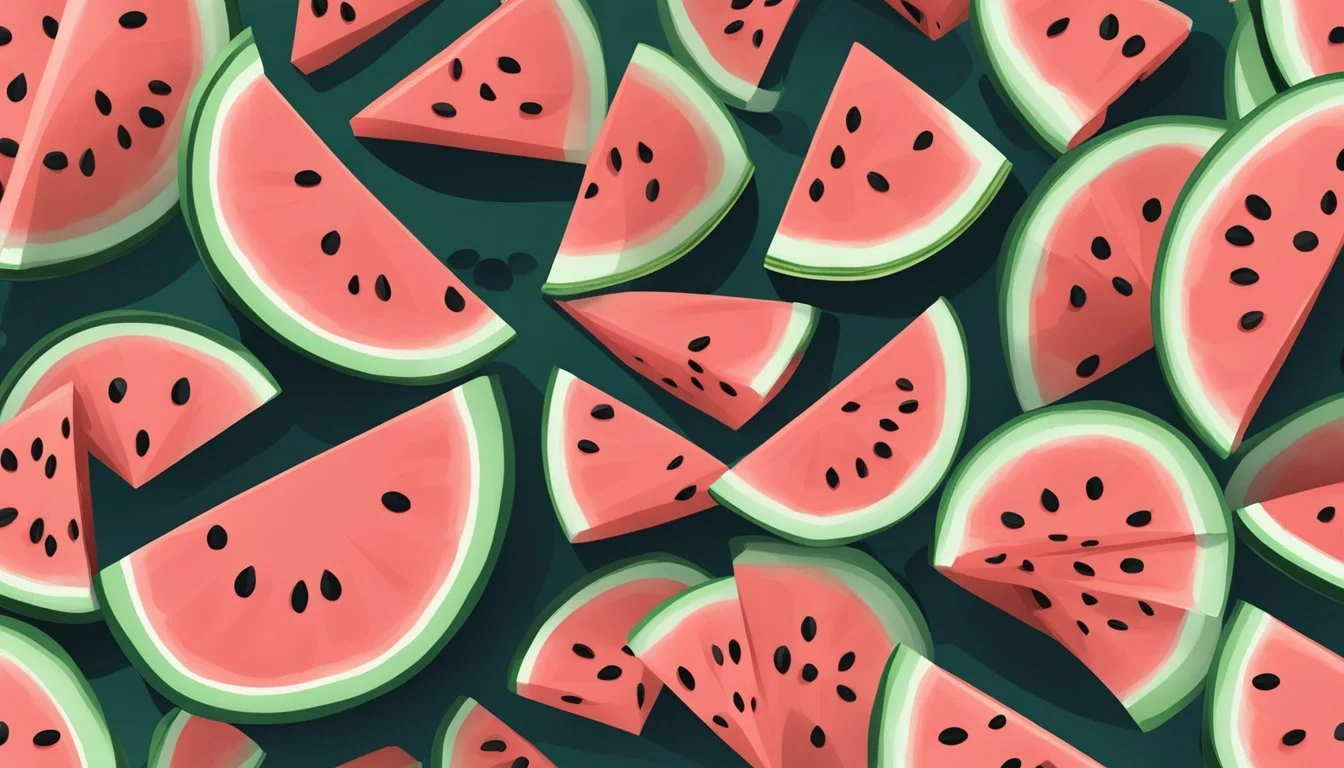How Much Watermelon Per Day Is Too Much?
Understanding Healthy Limits
Watermelon is a refreshing and nutritious fruit that offers a range of health benefits. It is an excellent source of hydration due to its high water content, making it a popular choice during hot weather or after physical activities. Rich in vitamins, minerals, and antioxidants such as lycopene, watermelon can contribute positively to a person's daily nutritional needs when consumed in moderation.
However, as with many foods, overconsumption of watermelon can lead to potential drawbacks. The fruit contains natural sugars, and excessive intake might affect blood sugar levels, particularly in individuals with diabetes. It also has a high water and fiber content, which, while beneficial for hydration and digestion in appropriate amounts, can cause digestive problems such as bloating or discomfort when consumed in large quantities.
The concept of moderation becomes key when incorporating watermelon into a balanced diet. Nutrition experts suggest that an appropriate serving size might be up to two cups of watermelon per day. This provides individuals with the sweet taste and health benefits of the fruit without overindulgence that could lead to unwanted side effects.
Nutritional Profile of Watermelon
Watermelon is renowned for its hydrating property due to its high water content and is accompanied by a diverse range of nutrients and vitamins that contribute to its health benefits.
Essential Nutrients and Vitamins
Watermelon provides a variety of vitamins and minerals that are essential for overall health. It is notably high in vitamin C and vitamin A, both of which are vital for immune function, skin health, and vision. Vitamin C acts as an antioxidant and is pivotal in wound healing and the maintenance of healthy gums and teeth. Additionally, watermelon is a source of potassium and magnesium, two minerals that play crucial roles in heart health, muscle function, and electrolyte balance.
Watermelon Nutrition Facts
When examining the nutrition facts of watermelon, it becomes clear that this fruit is low in calories yet rich in nutrients. Here is a brief overview of what 100 grams of raw watermelon typically contains:
Water: Approximately 91%
Calories: Around 30
Protein: 0.6 grams
Fat: 0.2 grams
Carbohydrates: Approximately 7.5 grams
Of which sugars account for about 6.2 grams
Fiber: 0.4 grams
Lycopene: 4,532 micrograms
Further, watermelon contains a product of subsidiary minerals including calcium and iron, though in smaller quantities. It also contains other antioxidants and electrolytes, promoting hydration and potentially offering some protection against certain diseases and conditions.
Health Benefits of Watermelon
Watermelon is more than a refreshing summer fruit; it boasts an array of health benefits that supports various bodily functions from hydration to heart health.
Hydration and Hydrated State
Watermelon is composed of about 92% water, making it an excellent choice for maintaining a hydrated state. Its high water content helps meet the body's fluid needs, an essential aspect of a healthy diet.
Antioxidant Properties
This fruit is rich in antioxidants, including vitamin C and lycopene. Antioxidants help combat oxidative stress and may reduce the risk of chronic diseases.
Heart Health and Blood Pressure
Consuming watermelon can have benefits for heart health due to an amino acid called citrulline, which may help lower blood pressure and improve circulation.
Cancer Prevention
The lycopene in watermelon, a potent antioxidant, has been linked to a lower risk of some types of cancer. Though more research is needed, these associations highlight the potential cancer-preventive properties of watermelon.
Digestion and Dietary Fiber
Watermelon contains fiber that aids in promoting a healthy digestive tract by preventing constipation and promoting regular bowel movements. However, excessive consumption may lead to digestive issues such as bloating and gas.
Muscle Soreness and Recovery
The amino acid citrulline found in watermelon may help reduce muscle soreness. It's also beneficial for athletes as it improves blood flow and may enhance exercise performance.
Skin Health and Collagen Production
Rich in vitamins A and C, watermelon supports skin health. Vitamin C is crucial for collagen production, which keeps the skin supple and aids in wound healing.
Dietary Considerations and Restrictions
Determining the appropriate amount of watermelon to include in your diet involves consideration of sugar content, potential food sensitivities, and the role it plays in weight management. Each subsection focuses on important dietary aspects connected to watermelon consumption.
Watermelon in a Balanced Diet
Watermelon can be a hydrating and nutritious addition to a balanced diet as it contains vital nutrients and is a good source of hydration. However, it is essential to consume it in moderation to maintain dietary balance. Dietitians often recommend 2 cups of fruit per day as part of a 2,000-calorie diet, acknowledging that individual needs may vary based on age, sex, and health conditions.
Sugar Content and Diabetes Risk
While watermelon is low in fiber, it has a high glycemic index (GI) due to its sugar content, primarily in the form of fructose. This makes it important for individuals with diabetes to monitor their portion sizes.
Sugar Intake: A healthy portion is approximately 1-2 cups, taking into account other sources of sugar in the diet.
Diabetes: Those at risk should track their blood sugar response to watermelon to avoid spikes.
Allergies and Food Sensitivities
Watermelon is generally safe for most people, but some may experience allergic reactions or sensitivities.
Irritable Bowel Syndrome (IBS): For people with IBS, watermelon may cause bloating or discomfort due to its fructose content.
Kidney Disease: Those with kidney conditions should consult with healthcare providers as watermelon's natural diuretic properties may affect fluid balance.
Watermelon for Weight Loss
Watermelon can be advantageous for weight loss due to its high water content and low-calorie density. However, because it contains natural sugars, portions should be kept in check to avoid excess calorie intake.
Natural Diuretic: It can aid digestion and reduce water retention.
Healthy Portion: Incorporating watermelon in moderation supports weight loss without overconsumption of sugars.
Potential Side Effects of Excessive Consumption
While moderate consumption of watermelon can provide hydration and essential nutrients, excessive intake may lead to certain side effects related to digestion, electrolyte balance, and nutrient absorption.
Bloating, Gas, and Digestive Issues
Eating large quantities of watermelon can cause bloating, gas, and other digestive problems due to its high water content and fodmap load. Watermelon is a fruit that contains both water and fiber, which, while beneficial in appropriate amounts, can lead to a feeling of being bloated and can cause digestive issues like diarrhea when consumed excessively.
Hyperkalemia and Electrolyte Imbalance
Overindulgence in watermelon may increase the risk of hyperkalemia, a condition caused by excessive potassium in the blood. Watermelon is nutritious and contains potassium, an important electrolyte. However, too much potassium can disrupt electrolyte balance, leading to dehydration and other related health issues.
Link to Liver Health and Lycopenemia
Excessive amounts of watermelon can potentially affect liver health due to its lycopene content. While lycopene has been linked to a reduced risk of cancer, overconsumption might lead to lycopenemia, a condition characterized by high lycopene levels that can cause a deep orange discoloration of the skin. Additionally, as a fruit with high water content and high glycemic index, eating too much watermelon might also affect blood sugar levels. It's essential to consume watermelon in moderation to avoid these potential side effects.
Serving Size and Consumption Guidelines
In the context of watermelon, establishing serving sizes and understanding consumption guidelines is essential for reaping health benefits without overindulging. A correct portion supports hydration, but excessive intake can unsettle blood sugar levels due to its sugar content.
Determining a Healthy Portion
One should consider factors such as individual nutritional needs, overall diet, and activity levels when determining a healthy portion of watermelon. Nutritionists typically recommend that a serving of fruit, including watermelon, should be around 150 grams or one cup of diced pieces. This portion size contains approximately 46 calories, 0.2 grams of fat, and 12 grams of carbohydrates. Watermelon is a food high in water content and provides hydration, but it's important to watch for its natural sugar content to avoid affecting blood sugar levels, particularly for individuals with diabetes.
Suggested serving size: 1 cup diced watermelon (150 grams)
Calories per serving: 46
Carbohydrates per serving: 12 grams
Role in a Healthy Diet and Lifestyle
Incorporating the right portion of watermelon into one's diet can contribute to a healthy lifestyle. Watermelon is rich in vitamins such as vitamin A and vitamin C, and contains a host of beneficial antioxidants that can influence blood pressure positively. Considering its nutritional profile, watermelon can be part of a balanced diet aimed at maintaining good health. However, dietitians advise moderation to prevent overeating. Watermelon seeds too are edible and nutritious, offering a good source of magnesium and iron. Always seek a ripe watermelon for the best nutritional value and remember that whole fruits are often preferred over juices to maintain adequate fiber intake and avoid added sugars or sodium.
Watermelon Varieties and Selection Tips
When picking watermelons, it's essential to consider the variety and how to determine its ripeness. Certain types are better suited for specific preferences or uses, and knowing how to select a ripe fruit is crucial for enjoying the best flavor and texture.
Different Types of Watermelon
There is a wide array of watermelon varieties, each with unique characteristics:
'Allsweet' typically weighs 25-30 pounds, sporting a classic dark and light green striped rind. It is favored for its disease resistance and suitability for long growing seasons.
Sugar Baby: This early-season variety produces smaller, sweeter 8- to 10-pound fruits that are perfect for individuals or small families.
Crimson Sweet: A mid-season variety known for its sugary flavor and disease resistance, yielding 20- to 25-pound fruits.
Moon and Stars (Cherokee): Recognizable by its speckled skin, this variety has sweet pink flesh and black seeds, averaging 15 pounds.
Carolina Cross #183: Some specimens grown from this type can exceed 200 pounds, making it an excellent choice for those seeking to grow giant watermelons.
How to Choose a Ripe Watermelon
Selecting a ripe watermelon involves a few key steps:
Check the Field Spot: This is the area where the watermelon rested on the ground. A creamy yellow or orange-yellow spot indicates ripeness.
Tap the Watermelon: A ripe fruit should produce a deep, hollow sound when tapped.
Inspect the Rind: A shiny appearance often indicates an underripe melon. Look for a dull sheen for optimal ripeness.
Firmness: The watermelon should be firm all over. Soft spots may indicate overripeness or spoilage.
Selecting the right type of watermelon and ensuring it is ripe can significantly enhance one's experience with this refreshing, fiber-rich summer fruit. Whether opting for a mini variety or a larger one, ripe watermelons are a hydrating choice due to their high water content.
Additional Considerations
When considering how much watermelon is too much to consume daily, it is crucial to consider not just the nutritional aspects but also the broader implications of watermelon consumption.
Environmental Impact and Seasonality
Watermelon is a summer fruit, and its production and availability can be impacted by environmental factors. Seasonality plays a crucial role; the best time to consume watermelon is when it is in season locally, as this minimizes the environmental footprint associated with long-distance transportation. Nutritionists often recommend eating seasonally for the freshest produce and to support sustainable agriculture practices.
There is also an environmental impact to consider. The growth and development of watermelon rely on suitable climate conditions. Excessive demand out of season can lead to increased greenhouse gas emissions from shipping watermelons over long distances. In addition, watermelons, like other crops, can be influenced by pollen-related allergies, as individuals sensitive to certain pollens may react to watermelon due to cross-reactivity.
Watermelon in Culinary Uses
Watermelon is a versatile ingredient in the kitchen, offering nutritional benefits like heart health support due to its content of citrulline and lycopene, which are comparable to the benefits found in tomatoes. Despite being a natural diuretic, excessive intake can lead to hydration imbalance and constipation, mainly if the diet lacks sufficient fiber from other sources. Watermelons have a low glycemic load, but it's still important to serve them in moderation.
Mini watermelons are an option that provide a smaller and often sweeter alternative, allowing for portion control. Watermelon can be included in various recipes from salads to desserts, keeping in mind that allergies to watermelon are possible though rare. Furthermore, seeds of watermelon are often discarded, yet they contain valuable nutrients and can be roasted for a healthy snack.









